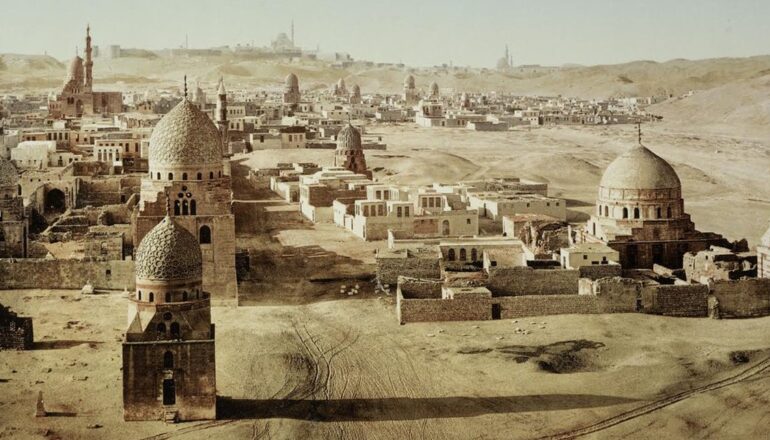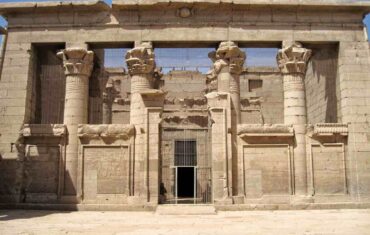The people of the Nile valley were belonging to the Monophysite school of Christian thought, had since the Council of Chalcedon (451) been condemned for their creed and persecuted as heretics, by their Byzantine masters.
Weary of this hated foreign domination, they were not disposed to put up any very vigorous resistance to the Arab invasion.
The Patriarch of Alexandria yielded up the city and surrounding area in 641; the siege of Babylon, near Memphis, came to an end in April 642. The population submitted to their new masters, and the Arabs established their camp at Fustat, now known as Old Cairo.
The Arabs set about occupying the country without any change in its administration, levying a land tax (Kharaj) and a poll tax for every non-Muslim adult male. The Egyptians retained the right to practice their religion; some churches were converted into mosques, but others were left in use for Christian worship. Nevertheless, a system of theocratic control bases on a different religion, combined with the coexistence of two different peoples, was bound in time to lead to measures of coercion. Such measures, however, were not an accepted practice. resulting rather from the decision of particular caliphs, viziers or governors than from the requirements of the Modern religion. Moreover, the situation changed very rapidly in the course of time: large-scale conversions to Islam took place, changing the proportions between the two religions so that by the end of the 8th century the Christians seem to have been in the minority. This process involved an extension in the use of Arabic; required to read the Koran (which must not be translated), and since Arabic was also the language of administration it came into general use throughout the country.
The Century of the Umayyads (660 – 750) saw the Muslim empire reached its greatest extent. A hundred years after Muhammad’s death the authority of the Caliph reached from the frontiers of China to the Atlantic and to Merovingian France. Egypt made a major contribution to the forces which made possible this westward expansion, both because it was a supply base and because it enabled the Arabs to learn the techniques of the seamanship of which they were ignorant and to build up the naval strength they required both to dominate the shores of the Mediterranean and to wage their constant struggle against Byzantium.
Being themselves without experience in the government of an empire of this size, the victors maintained the administrative patterns of the vanquished, together with the Christian administrators who kept the machinery functioning. The same situation obtained in other activities where the Arabs lacked practical knowledge or aptitude: thus, in Egypt, the natives were able to retain their previous employments in agriculture, trade, the crafts, and seafaring.
The very heavy tax levied by the Caliphs, however, was no less burdensome than the earlier Byzantine taxation, and the people of Egypt aspired for independence and freedom from the tribute. In the Umayyad period, therefore, there were repeated rebellions among the Copts, then in 750 propagandas emanating from Iranian Khorasan led to the overthrow of the Damascus dynasty, and the whole family was wiped out apart from Abd El-Rahman, who fled to Spain and founded the Dynasty of Cordoba. The Caliphate now fell into the hand of the Abbasid family, which traced its decedent from Muhammad’s uncle. The Umayyad Marwan II sought refuge in Upper Egypt but was overtaken and killed.
The founder of the Abbasid Dynasty abandoned Damasus and established himself in Baghdad, In an Iranian background, whose influence now became predominant. In spite of its apparent power and splendor, however, the Caliphate was soon undermined by risings and palace revolutions and finally fell to pieces by a process of dismemberment as various provinces freed themselves from the domination of Baghdad and ceased to pay the required tribute to the central authority.
By the time of Mutasim, (833-842) the army could no longer be relied on, and Turkish slaves were brought in to form the Caliph’s bodyguard. These Turkish incomers rose to considerable importance and gradually eliminated the Arab elements.
The Reign of Moutawakel (847-861) can be taken as marking the period of decadence of the empire, although it still maintained its economic and intellectual advance.
In 868 the government of Egypt was entrusted to a military leader of Turkish origin, Ahmed Ibn Tulun. After showing himself an upright administrator on behalf of the Caliphate, he began to operate on his own account and ceased to send the product of the taxes to Baghdad, though still maintaining some appearance of dependence by causing the Caliph’s name to be mentioned during the Khutbah (the ritual Friday sermon in the Mosques). In 878 Ibn Tulun Seized Syria, carried out various works that promoted the prosperity of the country and erected a number of religious buildings. including the famous mosque in Cairo which bears his name. The burden of taxation was reduced, and the popularity of the new leader was sufficient to enable him to have his son recognized as his successor and to believe that he had founded a lasting dynasty. In this, however, he was deceived. His son Khumaraweih lacked his father’s qualities; in his reign, the power of the dynasty declined, and in 905 it collapsed. But although the Caliphate was then able to restore its authority, this was not for long.
In 935 the descendant of one of Mutasim’s Turkish guards. Muhammad Ibn Tughj, also known as Ikhshid, had no difficulty in founding a new independent dynasty, the Ikhshidid dynasty. This uncultured soldier managed to bring together under his authority, in addition to Egypt, part of Syria, Yemen and the holy cities, forming a kingdom which he ruled with efficiency and energy. in the military field, he fought against the warlike Hamdanid princes of Aleppo and concluded an agreement with the “Emir of Emirs” in Baghdad, who had succeeded in dividing up the authority of the Caliphate, leaving the Caliph with the spiritual authority while he himself assumed temporal power.
When Ikhshid died in 940 his sons had a regent an Abyssinian eunuch named kafur, who was later recognized by Baghdad as ruler of Egypt. While continuing his struggle against the Hamdanids Kafur made Fustat a flourishing cultural center while scholars, historians, and poets were received and treated with munificence.



